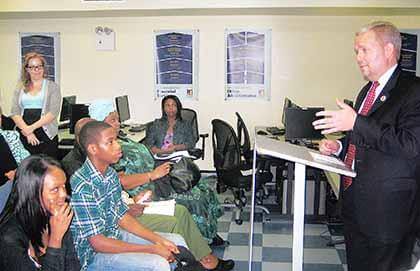By Rebecca Henely
Many prospective college students dread writing application essays. So Bethany Cureton, coordinator for the East River Development Alliance’s College Access Program, found a way to make the process both modern and fun by having the students record their essays on podcasts.
“What you guys have done over the summer is just really amazing,” Bishop Mitchell Taylor, chief executive officer of ERDA, said to the participants in the college preparation program.
ERDA is a Long Island City nonprofit that has multiple programs to help public housing residents better their lives, and it does that in part through its university prep program, College Access. Podcasts are listening programs similar in style to radio shows, but they are downloaded off the Internet, including the iTunes store.
Cureton said she got the idea for using podcasts as an essay-writing tool for College Access’ senior students through listening to National Public Radio’s StoryCorps, in which two people who know each other tell a story through an interview format. Segments of the interview are sometimes broadcast on NPR or available for download on NPR’s website.
“It really gets the people to open up,” Cureton said.
She decided that the participants in ERDA’s College Access Program should do something similar.
“It got them to realize they could make a college essay from everyday moments,” Cureton said.
Adam Glenn, 16, one of the participants in the program, said each student in the program wrote a draft of his or her college essays. Then after reading every member of the senior program’s essays, they searched for common themes and then wrote a script with pieces of all the essays.
“We all put in our input and our experiences and then we wrote this podcast,” Glenn said.
Cureton said there are 21 students in the group and so far they have made two podcasts, one with the theme of “home” and the other with the theme of “performing arts.” Cureton said one podcast takes three hours to record — each student records their lines separately, then the lines are edited together in an Apple sound editing program called Garage Band. Cureton said she edits the podcasts, although the students have input into what music and sound effects in Garage Band they use.
“In the future, I want to teach them to use the technology as well,” Cureton said.
The students plan to record seven podcasts in all, which will be available for download on iTunes by searching for “ERDA College Access” or on ERDA’s website, erdalliance.org, in the near future.
Glenn said making the podcast helped him understand what he wanted to write about it.
Manal Janati, 17, another participant in the program, said she realized while doing this project how small moments affected her life. She said her favorite part was hearing the finished product.
“When we recorded, it was all separate,” she said. “It was not a conversation.”
ERDA’s College Access Program provides college preparation to 50 juniors and seniors a year and helps them prepare for the SATs and applying for college and financial aid. They also offer case management for college students.
City Councilman Jimmy Van Bramer (D-Sunnyside), who contributed to paying for College Access with $22,000 of his discretionary funding, praised the program. As one of eight children in his family and the first to go to college, he said he needed help with applying for college and financial aid, but often could not.
“Programs like this are so important to me,” Van Bramer said.
Reach reporter Rebecca Henely by e-mail at rhenely@cnglocal.com or by phone at 718-260-4564.


































